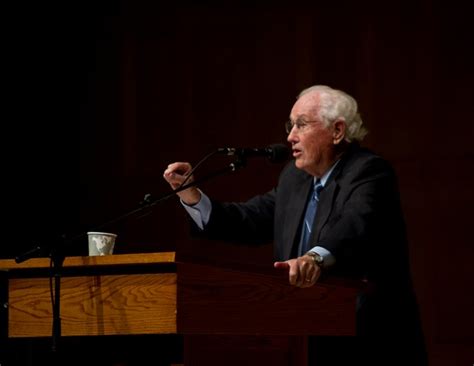A Quote by Gustavo Gutiérrez
The God of Exodus is the God of history and of political liberation more than he is the God of nature.
Related Quotes
What is sin? It is the glory of God not honored. The holiness of God not reverenced. The greatness of God not admired. The power of God not praised. The truth of God not sought. The wisdom of God not esteemed. The beauty of God not treasured. The goodness of God not savored. The faithfulness of God not trusted. The commandments of God not obeyed. The justice of God not respected. The wrath of God not feared. The grace of God not cherished. The presence of God not prized. The person of God not loved. That is sin.
To make it really clear and simple, let's call this movement across history we see in passages like the ones we just looked at from Exodus and Deuteronomy clicks. What we see is God meeting people at the click they're at, and then drawing them forward.When they're at F, God calls them to G.When we're at L, God calls us to M.And if we're way back there at A, God meets us way back there at A and does what God always does: invites us forward to B.
It is one of the ironies of religious history that many mortals err in their understanding of the nature of God and end up rejecting not the real God but their own erroneous and stereotypical image of God. Frequently this is because they have thought of God solely in terms of thunderings at Sinai without pondering substance. . . .
If we are in Christ the whole basis of our goings is God, not conceptions of God, not ideas of God, but God Himself. We do not need any more ideas about God, the world is full of ideas about God, they are all worthless, because the ideas of God in anyone’s head are of no more use than our own ideas. What we need is a real God, not more ideas about Him.
The idea of a judgment of history is secularism's vain, meaningless, hopeless, pathetic attempt to devise a substitute for what the great Abrahamic traditions of faith know is the final judgment of almighty God, who is not an impersonal force. History is not God. God is God. History is not our judge. God is our Judge.
The scientist who recognizes God knows only the God of Newton. To him the God imagined by Laplace and Comte is wholly inadequate. He feels that God is in nature, that the orderly ways in which nature works are themselves the manifestations of God's will and purpose. Its laws are his orderly way of working.
What do you conceive God to be like? Some would say to believe at all in a personal God requires a giant leap of faith - but I am convinced that belief in God is a far more reasonable position than atheism. Nature, the personal experience of literally billions of people, and something innate in the heart of man all testify to the existence of God.
A Christian should know that God is a Creator, that God is an entity that is all-powerful and all knowledgeable, God is everywhere and God is an entity filled with grace, love, compassion and forgiveness, that Jesus is the son of God and Jesus came on earth to explain to people in a very revolutionary way the nature of God, that God was not a stern judge who was keeping track of 600 or so rules and regulations that you had to keep in order to be acceptable to God.
The rule of God is not tyranny, for it does not partake of a political or governmental character -- it is not a rule of authority. God is not a governor of the universe, for a governor rules over those of a like nature with himself, and exercises a political and judicial power, while God exercises a creative, a preserving, and a determinative power of an altogether different kind. If I am a servant of God, I am under no tyranny; for God does not govern, but supports, sustains, and directs me.
Sunday morning in America is the greatest hour of idolatry in the whole week. Why? Because most people who are even worshiping God, are worshiping a God they don't know. They're worshiping a god that looks more like Santa Claus than the God of Scripture. They're worshiping a god that is a figment of their own imagination. They created a god in their own likeness and they worship the god they've made.
You hear a lot about God these days: God, the beneficent; God, the all-great; God, the Almighty; God, the most powerful; God, the giver of life; God, the creator of death. I mean, we're hearing about God all the time, so we better learn how to deal with it. But if we know anything about God, God is arbitrary.





































